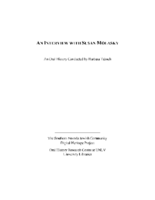Search the Special Collections and Archives Portal
Search Results

Transcript of interview with Irwin Molasky by David G. Schwartz, April 23, 2014
Date
Archival Collection
Description
Interview with Irwin Molasky by David G. Schwartz, April 23, 2014. In this interview, Irwin Molasky discusses arriving in Las Vegas in the 1950s, and building the Pyramids motel on the Strip. He talks about the entertainers in various hotels on the Strip, the concept of the "star policy," and bringing Parisian shows to Las Vegas. He goes on to discuss his real estate developments, including Paradise Palms, Boulevard Mall, and Sunrise Hospital, and donating the land for the development of UNLV.
Irwin Molasky came to Las Vegas in 1951, during a time when "everyone knew everyone else," and there was a small, but strong Jewish community. An Army veteran, Irwin and his wife moved to Las Vegas after living in California for a short time. Irwin soon built The Pyramids, a Strip motel next to the Flamingo Hotel and Casino. The Pyramids opened the same day as its northern next-door neighbor, The Sands Hotel and Casino, on December 15, 1952. Irwin used his newly acquired contractor's license to become on the city's most important real estate developers. Over the next 60 years, he built everything from residential housing, including Paradise Palms to commercial properties. Projects included Sunrise Hospital and the surrounding medical buildings; Sunrise City Shopping Center and other power centers; Bank of America Plaza and much other downtown development; and golf courses. When the recession hit, Irwin began bidding on government projects across the country, successfully shielding his business and employees from the economic downturn. Irwin's real estate ventures not only had a tremendous impact on Las Vegas' economic development, but a substantial effect in social programming. Irwin donated 40 acres of prime real estate to the University of Nevada - Las Vegas (UNLV) so that university could expand. Additionally, he was the Founding Chairman of the UNLV Foundation and received an honorary doctorate in humanities.
Text

Transcript of interviews with Louis Wiener, Jr. by Eleanor Johnson, January-February, 1990
Date
Archival Collection
Description
In this multi-part interview, Louis Wiener, Jr. discusses coming to Las Vegas from Pittsburgh at a young age, attending Las Vegas High School and University of Nevada Reno. He attended law school at University of California at Berkeley and passed the Nevada State Bar in 1941. He established a practice, Jones, Wiener and Jones, with Bob Jones and Cliff Jones and later with Herb Jones. He had another practice with Neil Galatz and Dave Goldwater, retiring in 1988. Wiener had other business ventures that allowed him to do pro bono work as a lawyer. Wiener discusses his family, including former spouses, his children, and various aspects of his career as an attorney in Las Vegas, representing hotels in the Greenspun antitrust lawsuit, and as an attorney for Bugsy Siegel. He says of his success, "I'm just lucky. I was here at the right time and I picked the right people to help."
Text

Transcript of interview with Judge Abbi Silver by Barbara Tabach, January 10, 2017
Date
Archival Collection
Description
It is evident that a keen wit and persistent tenaciousness to protect victims of crime have earned Judge Abbi Silver the reputation that elevated her to her current position as Chief Judge of the Nevada Court of Appeals. She is the first female to hold this position. Judge Silver is a lifelong resident of southern Nevada. She was raised in Boulder City, where her family was the only Jewish family at the time. Her father was a doctor and eventually the family moved into Las Vegas, where she graduated from Clark High School and then University of Nevada, Las Vegas (1986). Always an overachiever, she worked multiple jobs?waitress, Utah Jazz cheerleader, dancer?while earning her undergraduate degree and then her law degree from Southwestern University of Law, in Los Angles (1989). In this oral history, Judge Silver recalls being a law clerk for Honorable Earle White, Jr., joining the Clark County District Attorney?s Office and being assigned as the Chief Deputy DA for the Special Victims
Text

Transcript of interview with Susan Molasky by Barbara Tabach, March 11, 2014
Date
Archival Collection
Description
In this interview, Susan Molasky discusses her childhood and teenaged years growing up in London, where she worked with in a fabric store. Molasky shares photos and momentos with the interviewer, and talks about originally coming to Las Vegas with her first husband, Leo Frey, in the late 1950s. She discusses raising her children in Las Vegas, and her bout with ovarian cancer, which prompted her involvement in Nathan Adelson Hospice. She continues to discuss her life with second husband, Irwin Molasky, and the causes they are involved in.
Susan Molasky was born in Israel (what was then-Palestine) in mid-1930s, the daughter of Bukharian Jewish immigrants. With the end of World War II, at the age of nine Susan, her sister and mother were able to get visas to live with her father in London. It was in England where Susan learned English and began working, at a fabric shop on Regent Street. In 1957, Susan married her first husband, and the couple moved to Las Vegas on January 1, 1958. She knew immediately that the city would be her home. Susan and her husband moved to Las Vegas to help her brother-in-law, Leo Frey, renovate and manage the Moulin Rouge; their primary business was long-term room rentals to casino employees, occasionally renting to tourists when the casino hotels were full. After two years, her husband changed careers paths and the couple moved to Europe. They had three sons before returning to Las Vegas in 1964. In 1973, Susan married Irwin Molasky, whom she had met through her work with the Sisterhood at Temple Beth Sholom; both sat on the temple's board. Susan enjoyed the excitement and glamour that defined Las Vegas during the 1970s, attending show openings, visiting movie sets, and socializing with stars. But more than this, Susan devoted herself to helping others, most notably through the opening of Nathan Adelson Hospice. Her own battle with cancer, as well as serving as a caretaker for others, ignited her commitment to establish quality hospice care in her beloved city, and she has continuously led the organization's fundraising efforts. There are now two Nathan Adelson Hospice facilities serving the greater Las Vegas area.
Text
Audio clip from interview with Freddie Glusman, October 29, 2015
Date
Archival Collection
Description
In this clip Freddie Glusman discusses the restaurant he owned and his charitable giving over the years.
Sound

Transcript of interview with Gary Sternberg by Barbara Tabach, February - April, 2015
Date
Archival Collection
Description
In this oral history, Gary explains how the family came to live in the United States?Cleveland and Los Angeles. In 1957, he married Noreen and they eventually came to live in Las Vegas where Gary worked for Sears selling washing machines, had a repair business and an importing business with Noreen. Gary was an entrepreneurial soul and inventive much like his father. He owns three patents.
On August 25, 1931, Augusta and Herman Sternberg welcomed their second child, Gerd (aka Gary), into the world of Cuxhaven, Germany. Augusta was a devout Christian of Polish ancestry who had fled Russian persecution. Herman was a German-born Jew salesman and inventor. The couple fell in love and had two children, Gary and Ruth who was a year and half older. By 1938, German politics were targeting Jews and Herman was ripped away from his Christian wife and children and sent to a concentration camp. Fate and friendship rescued Herman with the option to go to China. And so begins the history of the Sternberg family and how they all would eventually live together during World War II in the confines of a Jewish ghetto in Hongkew, China from May 1939 to July 1948. Gary had an extraordinary career as a dealer. He was not the stereotypical young dealer-to-be: he was in his 40s when he signed up for the Michael Gaughn Dealing School in the mid-1970s. Gary?s charming wit and ease of making friends soon gained him a position at El Cortez and then Caesars Palace. It was the same personality that would sustain his stellar thirty-one year career at Caesars. He was employed there from April 1974 until his retirement May 8, 2005. Though Jewish tradition would identify Gary as Christian, he self-identified as Jewish, officially converted and has been an active member of the Jewish community. Among his anecdotes-and he has many-is one about securing a $30,000 donation from Frank Sinatra and Jilly Rizzo for Congregation Ner Tamid.
Text

Transcript of interview with Jay Poster by Barbara Tabach, August 26, 2016
Date
Archival Collection
Description
Music brought Jay Poster to Las Vegas for a brief time in 1974. Jay wanted to pursue a musical career and his cousin was a professional musician with the Nat Brandwynne Orchestra at Caesars Palace. To Jay?s disappointment, within a few months his cousin Jack Poster left Las Vegas for a road tour. So Jay decided his best strategy was to return home to San Diego and his studies at San Diego State University. It would be over a decade later before Jay returned to Las Vegas to live and this time it became permanent. This time it was not for music. For beyond his musical talent, Jay had a gift for connecting with people of all of ages and walks of life. He was good at sales and his day job selling office furniture offered him the opportunity to transfer to Las Vegas in 1986. Within a few years, however, it was a recruiter for Palm Mortuaries who introduced Jay to his defining career moment and to Allen Brewster, a prominent Jewish leader and founder of King David Cemetery and Mortuary. It was 2001. Jay has been King David?s ever since and is the General Manager. In this interview, Jay describes his personal and spiritual growth through his career in funeral services and his respect for the Jewish traditions of burial and grieving. In addition, his passion for music has also soared and he talks about his participation in the Shabbatones at Congregation Ner Tamid and Desert Winds, a community based performance organization. He shares his love of traditional Jewish klezmer music and the Meshugginah Klezmorim.
Text

Transcript of interview with Sharon Walker by Barbara Tabach, October 8, 2014
Date
Archival Collection
Description
Sharon Walker is a real estate investor, retired stockbroker and former loan officer. She was born on December 8, 1949 in Toledo, Ohio, and moved to Las Vegas with her family in 1963, where they started Walker Furniture, a store which they later sold to the Alterwitz family. Sharon's father, Julius Walker, was also in the casino business, becoming an owner of the El Cortez Hotel and Casino with Jackie Gaughan. Her mother, Anne Walker was a founding member of the first local Hadassah, The Women?s Zionist Organization. Sharon continues the family tradition of being active in Hadassah as well as being a Board Member of Jewish Family Service Agency. In November 2014 she was an honoree of Hadassah Leadership. In this interview, Sharon describes her adolescence in Las Vegas and the differences in culture as compared to her childhood in Toledo, Ohio. She also recalls the Walker Furniture business, her father?s careers, and her uncles Ed ?E? Walker and Lou ?Paddock? Walker.
Text

Transcript of interview with Michael J. Shane by Barbara Tabach, October 26, 2016
Date
Archival Collection
Description
Michael Jay Shane is a natural musician and entertainer. Born in New York City in 1961, Shane is a graduate of the famous High School of Performing Arts, and later attend Peabody Conservatory of Music, before leaving to launch his musical entertainment career full-time. Shane has had a varied and full career ever since as a musical entertainer, working as emcee, comedian, voiceover actor, and musician, showcasing the piano, guitar, saxophone, clarinet as well as vocals. He moved to Las Vegas in 1995, and jobs have included playing the piano at Wynn?s Tower Suite Bar, Bootlegger, and currently, Italian American Club. In this interview, Shane shares about his family and a childhood filled with music. He discusses his career trajectory, and the influence Judaism has had in his upbringing and work. He details differences between working in New York City and Las Vegas, what makes Las Vegas unique for any musician or musical entertainer, and talks about changes in the local entertainment scene since corporations took over the gaming industry. He also shares stories about his career, including working with Jerry Lewis and following Andrew Dice Clay?s standup act.
Text

Transcript of interview with Ruth Urban by Barbara Tabach, August 24, 2015 and September 16, 2015
Date
Archival Collection
Description
In this interview, Urban discusses her upbringing in Las Vegas, and childhood friendships, many which came from within the Jewish community. She talks extensively about her professional career and passion for mediation as a strategy for problem-solving. In addition, Urban describes her community service commitments over the years, including her current role with Nevadans for the Common Good. Urban married Andrew Urban Jr. in 1983, and the couple have a son, Andrew Urban III.
Text
